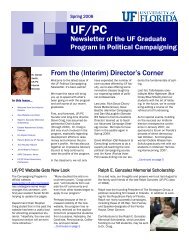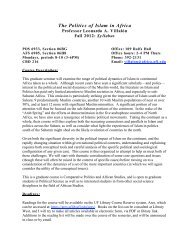Globalization and Diplomacy: A Practitioner's Perspective
Globalization and Diplomacy: A Practitioner's Perspective
Globalization and Diplomacy: A Practitioner's Perspective
You also want an ePaper? Increase the reach of your titles
YUMPU automatically turns print PDFs into web optimized ePapers that Google loves.
Talbott<br />
Working "Multi-Multilaterally"<br />
Paradoxically, while globalization induces international cohesion <strong>and</strong><br />
empowers international enterprises, it also accentuates the limitations of<br />
national power. Governments are often too cumbersome to respond effectively<br />
to transnational threats-including when those threats are manifest<br />
within their own borders. Partly as a result, political authority is devolving<br />
from the top down <strong>and</strong> from the center outward, to local <strong>and</strong> regional governments,<br />
<strong>and</strong> to community organizations working at the grassroots.<br />
Therefore, many governments, including the U.S., have sought to<br />
leverage scarce resources <strong>and</strong> improve their ability to address transnational<br />
threats by forming coalitions with "nonstate actors"-multinational<br />
corporations, nongovernmental organizations (NGOs), <strong>and</strong><br />
international institutions like the United Nations, the World Bank,<br />
<strong>and</strong> the International Monetary Fund. These coalitions allow the<br />
United States to work not only multilaterally, but multi-multilaterally,<br />
through several organizations <strong>and</strong> institutions at the same time.<br />
In Bosnia, nine agencies <strong>and</strong> departments of the U.S. government are<br />
cooperating with more than a dozen other governments, seven international<br />
organizations, <strong>and</strong> 13 major NGOs-from the Red Cross to the<br />
International Crisis Group to the American Bar Association-to implement<br />
the Dayton Peace Accords.<br />
In the Middle East, the United States chairs the Multilateral<br />
Working Group on Water Resources, a group of 47 countries <strong>and</strong><br />
international organizations that are working to ensure that the<br />
region's shared dependence on a scarce resource does not become a<br />
threat to political stability. The governments of Israel, Japan, Oman,<br />
South Korea, <strong>and</strong> the United States have established the Middle East<br />
Regional Desalination Center in Muscat to support research to<br />
reduce the cost of desalination.<br />
An interagency Food Security Working Group co-chaired by the<br />
Department of State, Department of Agriculture, <strong>and</strong> USAID is looking at<br />
new ways to apply American knowledge, technology, resources, <strong>and</strong> influence<br />
to ensure that there will be adequate food to meet the dem<strong>and</strong>s of the<br />
next century. Under this group's auspices, the U.S. National Oceanic <strong>and</strong><br />
Atmospheric Administration is leading an international initiative that<br />
brings together governments, private companies, <strong>and</strong> NGOS to begin experimental<br />
forecasting of seasonal climate patterns, so that crop planting can<br />
be adjusted to anticipated annual rainfall, thereby helping to reduce the<br />
severity of food emergencies.<br />
FALL 1997 79








